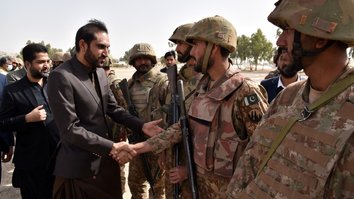QUETTA -- Recent arrests of terror suspects in Balochistan have revealed the involvement of Iran in suicide attacks and destabilising activities in Pakistan, officials say.
Counterterrorism authorities on Friday (September 24) announced the arrest of three accused members of a terrorist cell with ties to Iran.
The arrests occurred during an intelligence-based operation in Turbat district, Balochistan province, as part of an investigation into a suicide attack last month.
"The suicide bomber involved in the August 20 suicide attack on Chinese personnel in Pakistani port city Gwadar was transported from the Ramin area of Iran," a senior Gwadar-based intelligence official said on the condition of anonymity.
Interior Minister Sheikh Rasheed Ahmad, at the time of the attack, attributed it to a young suicide bomber who detonated his explosives near a vehicle carrying Chinese citizens as it neared a fishermen's colony.
The blast killed four children and injured a Chinese national, according to Pakistani officials.
"Following the investigations in the suburbs of Turbat on September 24, our intelligence team first arrested a terrorist named Arif, alias Nadir," the intelligence official said.
Based on information obtained from Arif, Balochistan Counter Terrorism Department (CTD) authorities arrested two other members of the group in a raid on a compound, he said. They also seized heavy weapons and explosives.
"The leader of the Iranian group involved in the recent wave of suicide attacks in Pakistan is a man named Rasool Bakhsh, who is said to be a resident of Sheeran Chabahar," the official said.
The group was also responsible for the May 2019 attack on the Pearl Continental Hotel in Gwadar, he added. That attack left four hotel employees, one Pakistani navy soldier and three terrorists dead.
Iranian conspiracies
Of the latest arrests, the intelligence official said, "This is an important development that has come to light in the context of ongoing conspiracies against foreign investment in our region."
"Targeted intelligence-based operations are still under way, and we expect more breakthroughs in the matter," he said.
"Our security agencies are working hard to thwart the intentions of the enemy, and a series of targeted operations are currently under way across the province," said Muhammad Bilal, a Quetta-based senior security official.
"Iran must ensure that its territory is not a safe haven for terrorist groups," he said.
"Pakistan has repeatedly pointed out to the Iranian authorities the whereabouts of terrorists in the Iranian areas adjacent to the Pakistan-Iran border, but so far no significant progress has been made in this regard," he said.
"This issue is also very important in terms of bilateral relations," he said, adding that the Iranian authorities must take "effective measures [to secure] the illegal routes along the long and insecure porous border affecting overall security situation in our region".
Pakistan has always striven for peace and has made every effort to secure the border with Iran, he said.
"Militant camps inside Iran indicate that Iranian forces have given free rein to those anti-peace elements that are involved in sabotage activities in neighbouring countries," he added.
"Every possible effort is being made by the enemy to obstruct Pakistan's economic development; that is why conspiracies are being hatched against the ... peace process," said Talat Shabbir, an Islamabad-based analyst and director of the Pakistan China Study Centre at the Institute of Strategic Studies Islamabad.
"In view of the changing scenario of the region, it is high time for Pakistan to revisit its policies, as safeguarding the national interest is essential and tactical measures are needed to tackle the scourge of terrorism," he said.
Growing challenges from Afghanistan
Since the Taliban takeover of Afghanistan, the challenges for Pakistan have been increasing, he said.
"Pakistan's internal policy should be according to the developing scenario as the enemy has always benefited from uncertainty in our country."
"Balochistan is strategically a very important part of this region and has always been destabilised by those proxies who are playing into the hands of anti-Pakistan forces," said Senator Kamran Khan Murtaza of Quetta.
"If the situation worsens in Balochistan, it will have a direct impact on the entire country," he said. "Anti-peace elements are trying to destabilise Pakistan by spreading unrest here, which the government and the country's political leaders must play their part to thwart."
"Serious and far-reaching measures are much needed to overcome the current crisis," he said.
"The government should use all its resources to prevent external interference," he added.

![Residents perform a funeral prayer for a victim of a suicide attack in the port city of Gwadar on August 20. [AFP]](/cnmi_pf/images/2021/09/28/31884-000_9lf3hx-585_329.jpg)







I think Pakistani governemnt rather getting pressure from Iran linked Shia political regime in the country must strictly ask Iran for violating the diplomatic norms. Iranian soil openly being used against Pakistan and it looks like Iranian authorities are behind all those attacks taking place at the Baloch belt along Pak-Iran bordering areas. I must say it is a very factual take and quite eye-opening who still believe on Iranian friendship in Pakistan. Musa Kazim , Gwadar
Reply1 Comment(s)